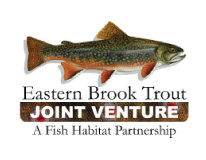Skip to content. | Skip to navigation

Sections
- Home
- About EBTJV
- The Story of Wild Brook Trout
-
Landowner Resources
- Cooperative Extension Service (NC)
- Maryland conservation funding and technical assistance
- Pennsylvania conservation funding and technical assistance
- PADEP Video: Guidelines for Maintaining Streams in Your Community
- Cattle don't grow in streams
- South Carolina Conservation Districts
- Connecticut conservation funding and technical assistance
- South Carolina Stream Bank Repair Manual
- Georgia Region 1 Soil and Water Conservation Districts
- Georgia conservation funding and technical assistance
- South Carolina conservation funding and technical assistance
- USDA Natural Resources Conservation Service (NRCS) Conservation Reserve Program (CRP) in North Carolina
- Rhode Island conservation funding and technical assistance
- USDA Natural Resources Conservation Service (NRCS) Conservation Reserve Program (CRP)
- NRCS EQIP Program
- Massachusetts conservation funding and technical assistance
- Appalachian Stewardship Foundation Grants
- West Virginia conservation funding and technical assistance
- Virginia conservation funding and technical assistance
- Northcentral Pennsylvania Stream Partnership
- Vermont Landowner Resources
- clean waters brochure
- Brook trout clean water brochure
- New Hampshire conservation funding and technical assistance
- Great Lakes Small Funding
- New York conservation funding and technical assistance
- Riparian Buffers for Private Lands - PA links to funding
- Saving Healthy Lands - Potomac Conservancy
- Brook trout healthy waters brochure
- Bay Restoration Fund Program
- Bay Restoration Fund Program FAQ and Application
- Wastewater photo
- Bay Restoration Fund Pre-Application
- North Carolina conservation funding and technical assistance
- NRCS Conservation Reserve Enhancement Program (CREP)
- NRCS - Environmental Quality Incentives Program (EQIP) in North Carolina
- NRCS Wildlife Habitat and Incentive Program (WHIP) in North Carolina
- Partners for Fish and Wildlife Program
- Agricultural Cost Share Program
- Fish Passage Program
- Trout Unlimited's Embrace A Stream
- Trout Unlimited's Land Conservancy Fund
- Shade Your Stream (NC)
- Reduce Rain Runoff (NC)
- Small-scale Solutions to Eroding Streambanks (NC)
- Riparian Vegetation (NC)
- NC Forest Service's Tree Planting Pocket Guide
- USDA National Agforestry Center's Multifunctional Riparian Forest Buffer Guide
- Find Your Niche
- Brook trout basics
- Regional Brook Trout Threats
-
Brook Trout Video and Webinar Gallery
- Bringing Back the Brooks - a Revival of the South's Trout
- Native Brook Trout Restoration, Haywood County North Carolina
- Cantrell Creek Habitat Improvement
- West Virginia Brook Trout
- Brook Trout Conservation in WV
- Fisheries - Responding to Drought and Water Challenges
- The use of environmental (eDNA) to inform fish eradication efforts to restore native aquatic species.
- Wild Brook Trout Restoration in Passage Creek, Virginia
- TU EBT importance
- Scicomm webinar: development of a genetic baseline for brook trout in North Carolina
- Restoring Wild Brook Trout to Passage Creek, VA
- From the Field: Linking Land and Water in Brook Trout Conservation from Chesapeake Bay Program
- Smith Creek Restoration Project
- From the Field: Tagged brook trout reveal the pristine health of Maryland’s Savage River
- Are brook trout near me?
- Eastern US map of wild brook trout patches
- Agency management plans and maps (states, tribes, federal)
-
Landowner Resources
- News & Events
- Projects
- EBTJV Funding Opportunities
-
2025 Projects
- Batavia Kill Reconnection Project for Brook Trout, Delaware County, New York
- North Fork Bens Creek Aquatic Passage and Large Wood Project
- Restoration and habitat enhancement for Southern Appalachian Brook Trout in Wright, Abner, Dogwood, and Emory Creeks, Jocassee Gorges, South Carolina
- Waits River Culvert Replacements in Groton State Forest, Orange, VT
-
2024 Projects
- Helicopter-assisted Large Wood Additions, Narraguagus River, TWP 34, ME
- Restoring a Brook Trout Metapopulation in Moore Springs Branch, Great Smoky Mountains National Park, NC
- Poplar Lick Run & Big Run Fish Passage Barrier Removal Projects Poplar Lick Run & Big Run, Fairview, MD
- Wheeler Pond Dam Removal and North Brook Restoration, Berlin, Massachusetts
- Small Dam Removal, East Branch North River, Whitingham, VT
- 2023 Projects
- 2022 Projects
- 2021 Projects
- 2020 Projects
- 2019 Projects
- 2006 - 2018 Projects
-
Project Completion Reports
- Smith Creek Headwaters Restoration, VA_FY06 Project
- Big Run Restoration, WV_FY06 Project
- Cooper Creek Restoration, GA_FY06 Project
- Browns River Watershed, VT_FY06 Project
- Habitat Restoration in Chattahoochee National Forest Streams, GA_FY07 Project
- Lynn Camp Prong Restoration, TN_FY07 Project
- Sunday River "Chop and Drop", ME_FY07 Project
- Whitethorn Creek Habitat Restoration, WV_FY07 Project
- Williams Run Acid Mine Drainage Mitigation, PA_FY07 Project
- Enhancing Connectivity in the Androscoggin River Watershed, ME_FY08 Project
- Rehabilitation of an Unnamed Stream, ME_FY08 Project
- Assessing the Efficacy of Remediating Episodic Low pH (and High Aluminum) Concentrations in Headwater Brook Trout Streams with Clam Shell Additions_FY09 Project
- Tipton Creek Culvert Replacement, NC_FY10 Project
- Restoring Connectivity in the West Branch Machias River, ME_FY10 Project
- Willow Creek Restoration, PA_FY10 Project
- Carloe Brook Fish Passage Restoration, ME_FY11 Project
- Lynn Camp Prong Brook Trout Restoration, TN_FY11 Project
- Restoring habitat connectivity in Machias and Saint Croix River tributary streams, ME_FY11 Project
- Enhancing Connectivity in the West Branch Narraguagus River, ME_FY11 Project
- Big Wadleigh Pond Restoration, ME_FY12 Project
- Jam Black Brook Culvert Replacement, ME_FY12 Project
- Removal of Two Dams in the Wetmore Run Watershed, PA_FY12 Project
- Dam Removals on an Unnamed Tributary to Frankstown Branch, PA_FY13 Project
- Scott Brook Fish Passage Restoration, ME_FY13 Project
- Aquatic Habitat Connectivity in the Upper White River Watershed, VT_FY13 Project
- Mill Creek “Chop and Drop”, WV_FY14 Project
- Little Cards Brook Culvert Replacement, ME_FY16 Project
- Anthony Creek & Little Cataloochee Creek Restoration, TN/NC_FY17 Project
- Dam Removal on the East Branch of the Passumpsic River, VT_FY17 Project
- Culvert Replacement in the West Musquash Tributary. ME_FY18 Project
- Bowman Creek, PA
- Wolf Den Run Final Report 2021
- Friends of Winooski River completion report 2022
- Peterson Pond Dam Removal completion report 11/24/2020
- Federal infrastructure funding
- Screenshot20250930at1.56.53PM.png
- Science and Data
- Update to the EBTJV assessment
- Assessment and Decision Support Tools
- EBTJV Maps Archive (pdfs)
-
Aquatic Organism Passage I&A and state design guidelines
- Modified Culvert Inventory and Assessment Protocol
- Chesapeake Fish Passage Prioritization: An Assessment of Dams in the Chesapeake Bay Watershed.
- Northeast Aquatic Connectivity: An Assessment of Dams on Northeastern Rivers.
- SEACAP: Southeast Aquatic Connectivity Assessment Project: Assessing the ecological impact of dams on Southeastern rivers.
- State Sream Crossing Guidelines
- New Hampshire Stream Crossing Initiative
- National Aquatic Barrier Inventory & Prioritization Tool
- EBTJV 2016 Catchment and Patch Data
- Symposium Proceedings
- Chesapeake Bay Program
- Whitewater to Bluewater (W2B)
- Brook Trout Genetics
- Brook trout restoration: non-native species removal and brook trout reintroduction
- Brook Trout Climate Resilience Research
-
EBTJV Reports
- Eastern Brook Trout Roadmap to Conservation (2018)
- Conserving the Eastern Brook Trout-Action Strategies_January 2018
- An Overview of Brook Trout Conservation Projects Supported by U.S. Fish and Wildlife Service National Fish Habitat Action Plan Funds, 2006-2018
- EBTJV Salmonid Catchment Assessment and Habitat Patch Layers
- EBTJV Conservation Strategy (2011)
- EBTJV Roadmap to Restoration (2008)
- Eastern Brook Trout: Status and Threats (2006)
- Status and Threats Fact Sheets
- EBTJV Print Material
- Conserving the Eastern Brook Trout: An Overview of Status, Threats, and Trends - 2005
- Search
- Donate




